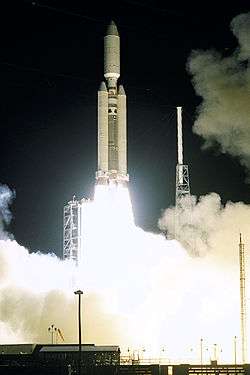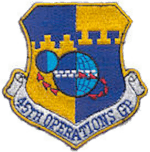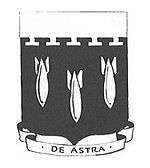45th Operations Group
| 45th Operations Group | |
|---|---|
 Cassini–Huygens spacecraft launch, 15 October 1997 | |
| Active | 1941-1942, 1991-present |
| Country | United States |
| Branch | United States Air Force |
| Commanders | |
| Current commander | Col Thomas Falzarano[1]As of 15 July 2014 |
| Insignia | |
| Patch with 45th Operations Group emblem (Approved 19 July 1967 for Air Force Eastern Test Range)[note 1] |
 |
| 45th Bombardment Group emblem (Approved 6 January 1943)[2][note 2] |
 |
The 45th Operations Group is a United States Air Force unit. It is assigned to the 45th Space Wing, stationed at Cape Canaveral Air Force Station, Florida.
Up until 2003, the 45th Operations Group was responsible for program management and operation of up to five squadrons which perform all Eastern Range launch operations including Delta II, Delta III, Atlas II, Atlas III, Titan IV, Space Shuttle, Pegasus, and Athena space launch vehicles.
The Operations Group provides support to Naval Ordnance Test Unit operations. In support of space launch operations, the Operations Group coordinates training for the wing, manages all wing spacecraft services systems and facilities, and manages the Patrick AFB air traffic complex, handling more than 24,000 aircraft operations annually.
Components
- 1st Range Operations Squadron. The 1st Range Operations Squadron provides range operations, operations support management, and scheduling services to National Aeronautics and Space Administration, the United States Air Force, United States Navy, and other Department of Defense partners.
- 45th Operations Support Squadron. The 45th Operations Support Squadron assures access to space to fulfill war-fighting, CINC and national requirements by providing policy decisions, training, and airfield operations for the 45th Operations Group, while managing all airfield and air traffic control services for the 45th Space Wing. Its Launch Operations Support Flight Provides behind-the-scenes support for all launches. It helps coordinate tours and launch viewing for distinguished visitors and coordinating launch critical briefings and conferences. Its Airfield Operations Flight manages the Patrick airfield and provides air traffic control services in support of the space range and the National Airspace System. Its Current Operations Flight coordinates and implements wing-level policies and procedures which provide the structure for launch operations. Its Spacelift Operations Training Flight provides wing training policy and guidance for more than 100 space launch operators.
- 45th Range Management Squadron. The 45th Range Management Squadron provides operations and maintenance services for all range instrumentation and critical launch facilities and quality assurance support to wing and delegated contractual efforts
- 45th Space Communications Squadron
- 45th Weather Squadron
- Detachment 1, Antigua Air Station, West Indies. This detachment was discontinued on 7 July 2015. It provided telemetry and radar tracking data to support space launches out of the Eastern Range. When not supporting space launches, it provided radar tracking data for locating and cataloging space objects in support of U.S. Space Command's Space Surveillance Network. Operated as part of the space tracking mission for approximately 50 years, and required over US$10 million per year operational cost in it later years.[3]
- Detachment 2, Ascension Auxiliary Air Field. This detachment provides telemetry and radar tracking data to support space launches out of the Eastern Range. When not supporting its primary mission, the unit has the secondary mission of providing radar tracking data for locating and cataloging space objects in support of the United States Space Command Space Surveillance Network.
- Detachment 3, Patrick Air Force Base. This detachment coordinates DOD contingency support for United States human space flight programs. Its roots go back to the 1959 charter by the Secretary of Defense as the DOD Mercury Support Office. Later renamed DOD Manned Space Flight Support Office. Since its inception the office has continued to be the principle facilitator for all DOD contingency support to Projects Mercury, Gemini, and Apollo; the Apollo-Soyuz Test Project; the Space Shuttle Program, the International Space Station/Soyuz Program; the Orion Program; and the presidential commercial space initiative.
History
- See 45th Space Wing and 45th Launch Group for additional lineage and history information
Organized in early 1941 as a First Air Force bombardment group equipped with A-20 Havocs, and later B-18 Bolos. After the United States entered World War II the group was ordered to search for German U-Boats and to fly aerial coverage of friendly convoys off mid and southeast Atlantic east coast from Delaware, then from South Florida, expanding its patrols to the Gulf of Mexico and Florida Straits.
Reassigned to Army Air Forces Antisubmarine Command in October 1942 and inactivated shortly afterwards, its component squadrons being redesignated Antisubmarine Squadrons and reassigned to the 25th Antisubmarine Wing.
Reactivated and re-designated in 1991 under Air Force Space Command. Operated "Down-Range" facilities at Antigua, Ascension Island, and Cape Canaveral, Florida; launched DOD payloads into orbit; and collected flight data for evaluation of ballistic missile systems launched from Eastern Launch sites for DOD, NASA, and commercial customers. Provided support for DOD, NASA, and commercial manned and unmanned space programs.
There were several organizational changes in the Wing in 1997 and 1998. Detachments 1 and 2 of the 45th Operations Group were inactivated on Antigua and Ascension on 1 June 1997, but they were replaced by Detachments 1 and 2 of the 45th Logistics Group on the same day. The 5th Space Launch Squadron was inactivated at Cape Canaveral Air Station on 29 June 1998, and its resources were absorbed by the 3rd Space Launch Squadron.
Launch operations were reassigned to the 45th Launch Group on 1 December 2003.
Lineage
- Constituted as the 45th Bombardment Group (Light) on 20 September 1940
- Activated on 15 January 1941
- Redesignated 45th Bombardment Group (Medium) in December 1941
- Inactivated on 8 December 1942
- Redesignated 45th Operations Group on 1 November 1991
- Activated on 12 November 1991[4]
Assignments
- 16th Bombardment Wing, 15 Jan 1941
- 1 Air Support Command, 21 Aug 1941
- I Bomber Command, 5 Jan 1942
- Army Air Forces Antisubmarine Command, 13 Oct 1942
- 26th Antisubmarine Wing, 20 November - 8 December 1942
- 45th Space Wing, 12 Nov 1991 – Present
Squadrons
- World War II
- 17th Reconnaissance Squadron (later 92d Bombardment Squadron, 92d Reconnaissance Squadron, 433d Bombardment Squadron): (Attached 15 January 1941, assigned 14 August 1941 - 21 November 1942)[5]
- 76th Bombardment Squadron: (Air echelon attached c. 21 May - 13 August 1942)[6]
- 78th Bombardment Squadron (later 7th Antisubmarine Squadron): 15 January 1941 - 7 December 1942[4]
- 79th Bombardment Squadron: 15 January 1941 - 21 November 1942[4]
- 80th Bombardment Squadron (later 9th Antisubmarine Squadron): 15 January 1941 - 7 December 1942[4]
- Since 1991
- 1st Range Operations Squadron: 1 December 2003 – present
- 1st Space Launch Squadron: 12 November 1991 - 1 December 2003[4]
- 3d Space Launch Squadron: 1 April 1992 - 1 December 2003[4]
- 5th Space Launch Squadron: 14 April 1994 - 29 June 1998[4]
- 45th Operations Support Squadron: 12 November 1991 – present
- 45th Range Squadron: 12 November 1991 - 1 December 2003
- 45th Range Management Squadron: 1 October 2002 – present
- 45th Space Communications Squadron: 1 December 2003 – present
- 45th Weather Squadron: 12 November 1991 – present
Stations
- Savannah Army Air Base, Georgia, 15 January 1941
- Grenier Field, New Hampshire, 18 June 1941
- Dover Army Air Field, Delaware, 16 May 1942
- Miami Army Air Field, Florida, 1 August - 8 December 1942
- Patrick Air Force Base, Florida, 12 November 1991
- Cape Canaveral Air Force Station, Florida, 1 November 1998 – present
Commanders
- Col James N. Posey, 12 November 1991[4]
- Col Michael R. Spence, 31 Jan 1992[4]
- Col Glenn C. Waltman, 20 August 1993[4]
- Col Gary R. Harmon, 28 April 1995[4]
- Col Philip G. Benjamin II, 9 June 1997[4]
- Col Darphaus L. Mitchell, 24 May 1999[4]
- Col Cameron S. Bowser, 11 June 2001[4]
- Col Gregory M. Billman, 7 March 2003[4]
- Col David D. Thompson, 29 June 2005[4]
- Col Bernard J. Gruber, 12 July 2007[4]
- Col James Ross, 21 May 2009
- Col Denette Sleeth,[7] 14 January 2011
- Col Douglas Schiess, 30 July 2012[7]
- Col Rob Quigg (Interim), 9 April 2014
- Col Thomas Falzarano, 10 July 2014 – present [1]
References
Notes
Citations
- 1 2 "45th OG change of command". 45th Space Wing Public Affairs. July 15, 2014. Archived from the original on 4 March 2016. Retrieved December 21, 2016.
- ↑ Maurer, p. 103
- ↑ Wallace, 1 Lt Alicia (July 13, 2015). "45th SW says Farewell to Antigua Air Station". 45th Space Wing Public Affairs. Archived from the original on 13 July 2015. Retrieved December 21, 2016.
- 1 2 3 4 5 6 7 8 9 10 11 12 13 14 15 16 17 Robertson, Patsy (September 9, 2008). "Factsheet 45 Operations Group (AFSPC)". Air Force Historical Research Agency. Archived from the original on 29 September 2015. Retrieved December 21, 2016.
- ↑ Maurer, Combat Squadrons, p. 789
- ↑ Maurer, Combat Squadrons, p. 120
- 1 2 "Col. Doug Schiess Assumes Command of 45th Operations Group". 45th Space Wing Public Affairs. August 2, 2012. Archived from the original on 22 July 2015. Retrieved December 21, 2016.
Bibliography
![]()
- Maurer, Maurer, ed. (1983) [1961]. Air Force Combat Units of World War II (PDF) (reprint ed.). Washington, DC: Office of Air Force History. ISBN 0-912799-02-1. LCCN 61060979. Retrieved December 17, 2016.
- Maurer, Maurer, ed. (1982) [1969]. Combat Squadrons of the Air Force, World War II (PDF) (reprint ed.). Washington, DC: Office of Air Force History. ISBN 0-405-12194-6. LCCN 70605402. OCLC 72556. Retrieved December 17, 2016.
External links
- "Library: Factsheet 45th Operations Group". 45th Space Wing Public Affairs. January 23, 2012. Archived from the original on 15 August 2015. Retrieved December 21, 2016.
.jpg)